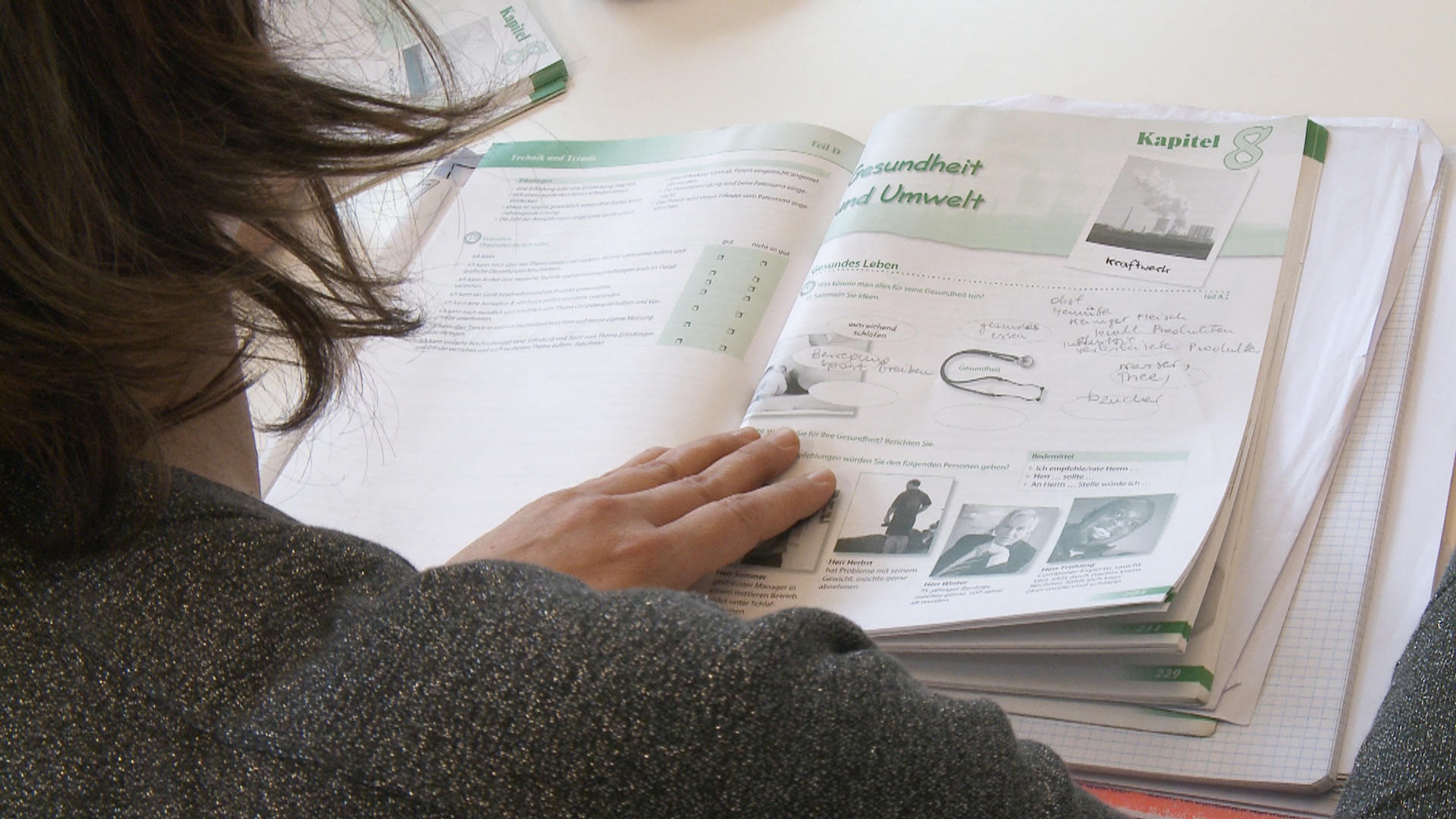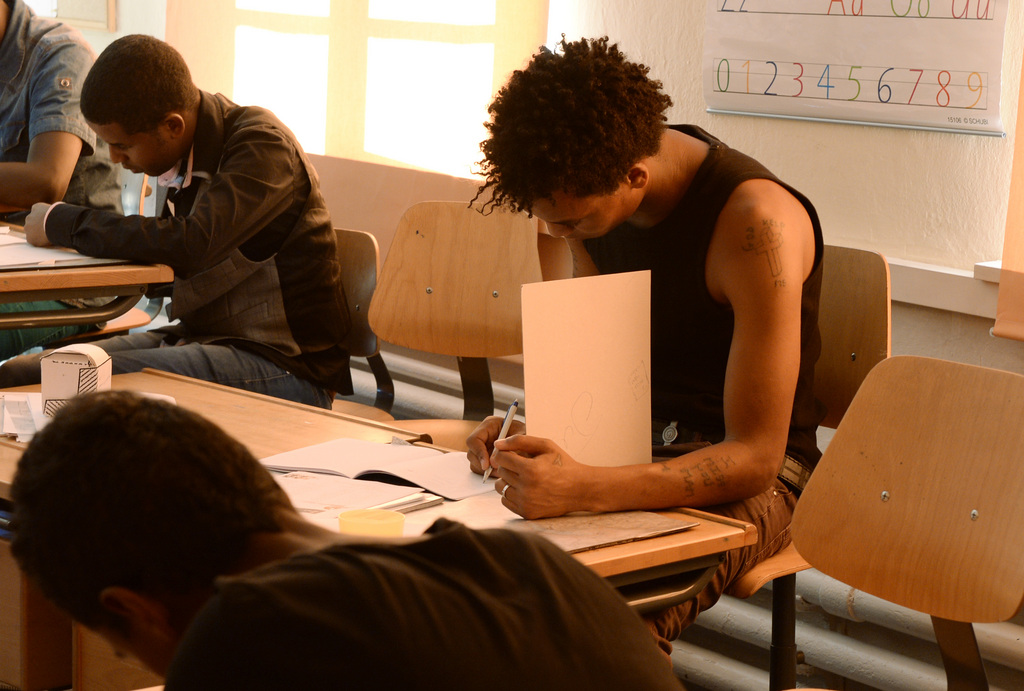The place where migrants get free language lessons

Foreigners moving to canton Basel City receive a voucher for free German lessons, paid for by the canton – in a scheme that is unique in Switzerland. The aim is to increase integration. But not everyone is making use of the voucher yet.
It’s a grey November day in Basel. At the Inlingua External linklanguage school in the centre of the city, four women are taking part in their intermediate level German class. The topic: healthy living. The women, in pairs, discuss eating and stress. There is lots of participation; the pupils are highly motivated.
Some of them have the Basel City vouchers, making them among the crop of new immigrants with a B residency permit (resident foreign nationals from the EU/EFTA, valid for five years) who can attend up to 80 free German lessons during their first year in the canton. The scheme has been in place since August 2015, with the vouchers having been issued since May of that year.

More
Free language classes help foreigners integrate
Inlingua reports an increase in students, mainly expats, since the scheme started. It’s a similar story at ECAPExternal link Basel, an institution for the training of adult foreigners of all nationalities. Since last August, 89 voucher students have taken the intensive German beginners course. Marion Kussmaul, who heads the intensive German department at the school, says it’s mainly women and the well-educated who have attended her courses. Often they have come with their families or are looking for a job.
Incentive
In canton Basel City, migrants make up 35% of the population (2015 figures), making it the canton with the second highest percentage of migrants after Geneva (41%).
“The canton wanted to create an incentive for people arriving in Switzerland to learn the language and through learning the language to find an easier way to integrate into our society,” said Ulrich Maier, head of secondary education and training at Basel City.
The voucher scheme forms part of a package for all new arrivals, accepted by voters on November 30, 2014 as a counterproposal to a rightwing initiative “for the better integration of migrants”. The Swiss People’s Party’s plan would have required the majority of migrants to forge an “integration agreement” with goals, among them language learning, to be met to gain a residency permit. Under this initiative, language courses would have been obligatory. Now they are voluntary.
By mid-August this year, 1,032 people, from 101 nations, had taken part in the Basel City voucher courses, according to one-year-on figures issued by Maier’s department in SeptemberExternal link. But given that 4,480 vouchers have been issued – and despite the increase of students at the schools – overall take-up has been relatively low at 23%.
Maier reckons that the actual quota is more like 33% because the authorities do not have the full picture yet. People have up to 12 months to take a course. “We only find out by the end of the course when the language schools turn in the vouchers how many people have attended,” Maier said.
Vouchers: one year on
A report issued by the canton Basel City education authorities found that between August 2015 and mid-August 2016, 1,032 people from 101 countries had taken part in the voucher courses. 214 courses had taken place.
Two-thirds of participants took a beginners’ course (level A1), but only a few finished their 80 free lessons at the intermediate level B2. 60% took part in at least 80% of the lessons. Dropping out mainly happened for professional or family reasons, a communiqué from September 29, 2016, said.
Experienced learners tended to take up the voucher offer: around half of the participants said they had more than 14 years of school and training. 54% of participants were working. The majority said they ‘had benefitted’ or ‘had benefitted a lot’ from the course and 62% went on to a follow-on course.
Hopes for more
“We had hoped that more people would profit from the vouchers,” he continued. “We’re still trying to find out why: whether it’s because the courses are not really attractive for people or whether because many people are very busy finding their way into the working environment or settling down their family in the area. So at very beginning, when they arrive, they don’t really have time to take German classes.”
One issue is that many foreigners work for international companies, he said. “They will not necessarily need to learn German and they don’t know how long they are going to be in Switzerland anyway, so it might be a two-to-three year thing for them. So learning German is an option but it’s not a necessity,” he explained.
Basel is the home to many multinationals, particularly in the pharmaceutical industry.
“We also have a lot of other people who come here and we know they are going to stay for a long time because they follow family members who already live in Switzerland. That’s the group we are targeting more than anybody else. And that’s what we’re trying to find out: whether we actually target the right group there.”
Maier says that the canton will continue with the scheme, as the authorities are legally bound to do so. “We also believe that those that we reach have a far better chance of integrating,” Maier said. Language is the key.
So far it is the only canton with these vouchers.
For the Inlingua students, the benefit is clear: “The better I speak the language, the easier it is to move around and find my own way,” says Dutchman Taco de Liefde.
Integration votes
Integration issues are among the five most frequent issues at the ballot box across all levels (federal, cantonal, local, said direct democracy expert Bruno Kaufmann. They also include questions on citizenship, free movement of people and voting rights for foreigners.
In the canton Basel City case, the clear no to the People’s Party initiative on migrants and the yes to the counter-proposal on November 30 2014 is: “a nice example of how the option to insert and vote on counter-proposals adds democratic value to the voting process, as fine-tuned solutions can be found and society can go beyond the black/white attitude on sometimes radical initiative proposals”, added Kaufmann.
There are no overall statistics on how successful counter-proposals are at all levels, Kaufmann explained. But one can say that they make a difference. “At the federal level, counter-proposals only have developed their constructive potential since it is possible to vote yes to both an initiative and the counterproposal in 1987 (double yes). Before counterproposals just split the vote and made positive majorities literally impossible. Also, while peoples’ initiatives and counter proposals at the federal level seldom gain straight majorities (only in about 15% of all cases), they are more successful at the cantonal level (approximately four out of ten).
What do you think of the idea? Should it be extended across Switzerland?

In compliance with the JTI standards
More: SWI swissinfo.ch certified by the Journalism Trust Initiative












You can find an overview of ongoing debates with our journalists here . Please join us!
If you want to start a conversation about a topic raised in this article or want to report factual errors, email us at english@swissinfo.ch.